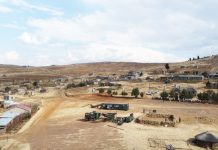By LAZARUS AMUKESHE | 10 January 2019
GIPF is a self-defined benefit scheme formed to provide retirement, death and ancillary benefits to government employees, and employees of other public institutions and public enterprises who participate in the scheme.
The fund has about 23 000 beneficiaries, with about 106 000 active members.
Members contribute 7% to the fund, while employers contribute 16%. The required contribution of both the employer and the employee was initially meant to be at 33%, but is now at 26%. GIPFs 10% return on investments currently covers the gap.
The International Monetary Fund (IMF) issued the warning in its report titled Fiscal Risk Statement released in November 2018.
In 2017, the government had announced that it was looking at offering early retirement packages for civil servants who wish to retire before the age of 60 as one of the solutions to cut the wage bill which is currently standing at N$30 billion, taking up about 50% of state revenue.
In his 2018/19 budget speech, finance minister Calle Schlettwein had also said the government was looking at internally filling vacancies, other than new employment and lower wage increments to cut the wage bill.
The IMF, however, said if the government retrenches and no new people are employed, there will be an unsustainable mismatch between the outflows and inflows from the fraud-hit pension fund.
As the number of civil servants starts to decrease, the fund will have lower levels of contributions inflows to support a growing pool of retirees.
“The 2015 GIPF actuarial valuation report estimates that for the next five years, inflows from contributions will grow at 9%, while benefits are expected to grow at 20% on an annual basis due to the maturity of the system”, the report said.
The IMF cautioned the government that if the state pension fund enters into such a situation where they are unable to fund benefit payouts, recovery will be difficult as the fund also relies heavily on volatile investment income.
“As of 2018, more than two-thirds of GIPFs total income comes from investments, 71%, which by nature are volatile,” the IMF said in the report.
Although the fund has been successful in maintaining a high return on investments in recent years, going forward, relying on investments alone may pose a risk for long-term funding of the scheme, which could be eventually transferred to the government as an ultimate guarantor.
In November 2018, GIPF said the fund had grown to an asset value of N$116 billion, with investments in Namibia at 37%, South Africa (26%), Africa (6%) and international markets (30%).
The GIPF has local investments in property, banking, infrastructure, land servicing and home loans financing.
The IMF also warned that population growth trends suggest that the fiscal cost of GIPF benefits will accelerate as the number of retirees and beneficiaries increase and live longer.
The IMF has also listed the old-age grant as an unsustainable scheme which needs to be reformed.
Developed to guarantee that all Namibias citizens over the age of 60 are entitled to a monthly allowance, the IMF said the scheme has deteriorated significantly from 1994 to 2007; had remained volatile since then; and showed an upward trend since 2014.
In 2015, president Hage Geingob had called for an increase in the old-age pension from N$600 to N$1 000. This was the highest-ever recorded increase, with lower yearly increases to the current N$1 250 in the subsequent years.
The allowance scheme is a flat-rate benefit, non-contributory and non-taxable, and is payable regardless of the recipients other income.
As of 2018, the IMF said there were about 152 000 citizens over 60 years of age in the country benefiting from the scheme, with an annual state expense of N$2,2 billion.
The N$2,2 billion is fully funded through the state budget, and any adjustment to the allowance is solely at the governments discretion.
“Changes in the monthly old-age grant have an impact on the deficit, representing a direct source of fiscal risk,” the fund said.
At the moment, the fiscal cost of maintaining the old-age grant accounts for 1,2% of GDP and 3,4% of central government expenditure.
Because of the high dependency on investments income, the IMF has advised that members contributions be increased, saying the increase will “reduce the excessive reliance on volatile investments”.
The fund also suggested that since population trends indicate an upward growth trajectory that will mostly come with inflation, to keep the inflow of contributions coming in, the government should look at increasing the retirement age. In 2016, labour expert Herbert Jauch had said if the governments initiative is to cut the wage bill by abolishing posts and implementing early retirement plans, GIPF will face the biggest predicament because they will have to deal with more dependent people.
With the elderly population expected to rise in coming years, the IMF said the fiscal sustainability of the scheme could be affected, and has advised that reforms be made, and an analysis of the data of recipients be done to develop alternative senior citizens support mechanisms.
The IMF also warned against the increases of the grant above inflation levels, as this will swell budget costs, adding that “the grant should be planned in line with the existing fiscal space.”
Economist Mally Likukela said the proposal to give early retirement will definitely put the social expenditure side of government under a lot of pressure and thus given the current fiscal stress this is not viable at all.
On increasing the employees contribution, Likukela said the idea is great but the government must incentivise employees to want to do that.
“What will it benefit employees in the long run. This is the question employers will ask before they can agree to do it,” He said.
Likukela said, at the time when real incomes have deteriorated, any additional expenses must be justifiable first of all and benefits to be clearly outlined if this idea is to get any buy-in.
NAPWU general secretary Petrus Nevonga however said the suggestion to increase employee contributions cannot be entertained.
He said that GIPF must take money away from politically owned unlisted investments that are not even part of the fund and let it be channeled to the fund members, that way there would not be much paid to the members and they will be better off.






